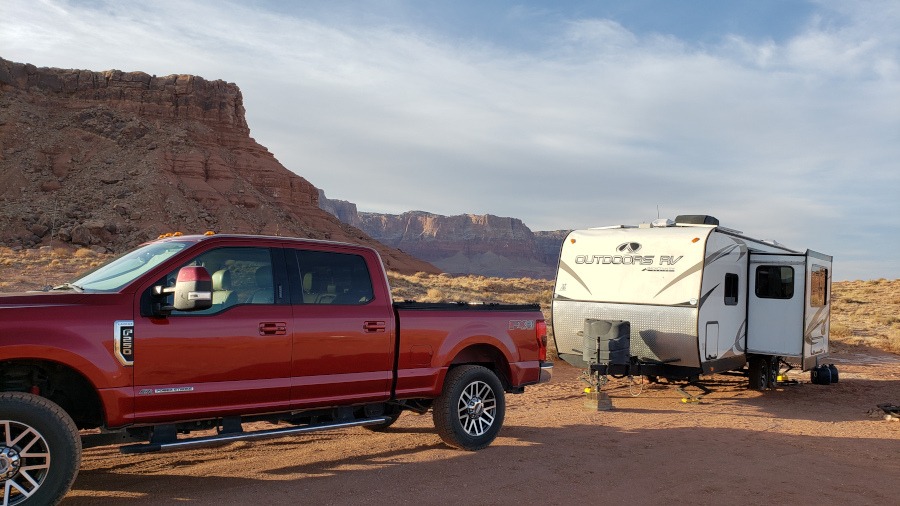Last Updated on 04/25/2024 by Glynn Willard
Is The Ford F-250 A Good Towing Vehicle?
Yes, the Ford F250 is a great tow vehicle, but there are some additional considerations.
There are a lot of great trucks on the market very capable of towing well. “Best trucks” for towing is subjective.
In writing this article/review, I have no brand loyalty with any of the big three truck brands. Read on.
I have a Ford simply because of chance and availability. But that doesn’t mean I haven’t paid close attention to its performance and maintenance.
And in my full-time RV travels, I have a lot of opportunities to speak candidly with owners of other tow vehicle brands.
I realize how strong brand loyalty is, so my intention is simply to report on the truck and give my feedback. I also realize that every vehicle has its quarks and there are plenty of lemons.
Let’s take a closer look at my 2017 Ford F250 Diesel with a tow package.
Don’t feel like reading? Listen to the audio version of this blog.
Why Did I Choose A Ford F250?
- I Didn’t Have Much Choice.
- I Wanted An Engine Brake
- I Wanted Diesel Power To Handle The High Volume Of Towing
- I Wanted Heavy Duty Brakes In Case The Trailer Brakes Failed
- Would A Ram, Chevy or GMC Have Gotten The Job Done?
- A Review Of GVWR, GAWR, GCWR, And Tongue Weight.
- GVWR: This is the total weight your truck can safely carry including the truck itself, the passengers, all fluids, and all cargo.
Keep in mind, that your tongue weight needs to be factored into your cargo. - GAWR: This is the maximum amount of weight each axle can handle safely.
Note that the rear axle and rear suspension on a truck can usually carry more weight than the front axle.
Beware of exceeding the maximum weight of the GAWR with cargo and tongue weight combined. - GCWR: This is the max weight of the combined truck and trailer weight. These numbers are published by the manufacturer and are very specific to the make, model, and gear ratio of each truck.
Pay very close attention to these charts for the specific truck you’re considering. - Tongue Weight: This is the amount of force pressing down on your truck hitch from the trailer. You must factor this amount into your cargo weight in the truck bed.
Depending on who you ask, it’s generally 10-15% of the gross weight of the trailer.To figure this out, it requires weighing the truck alone, the trailer alone, and then the two combined.
That’s not always possible for all of us, so math plays a role.
Some cool hitches can give you a close estimate.
- How Much Weight Do I Tow With My F250?
- How Much Weight Do We Carry In Our Ford F250?
- Diesel engines weigh more and eat into your truck’s payload. More so than powerful engines that burn gasoline.
- Four-wheel drive trucks weigh more and also diminish your allowable payload.
But if you plan on boondocking on the type of terrain that includes dirt roads, especially in poor weather conditions, you’ll find a 4×4 to be worth the compromise. - Higher-end trim levels weigh more and lower your total payload capacity.
- If you don’t need a backseat, you can increase your payload capacity a lot.
- What Kind Of Bed Cover Do We Use?
- What Do I Wish I Had Known Before Buying An F250?
- Suggestions For Purchasing The Right Truck For Your Travel Trailer
When I purchased my Outdoors RV travel trailer, I bought the tow vehicle from the seller. It was a 15-passenger Chevy Express.
It could pull just fine, but it strained on the inclines.
And worse, it struggled on the declines even after installing beefier brakes. So, I began looking for heavy-duty trucks simply for peace of mind.
I didn’t want to travel far, I wanted a “super duty” version of any brand with a high payload capacity and it had to be used with low miles.
And I at least wanted any of the trim levels that were comfortable for a family.
Lastly, I didn’t want to put a lot of time and effort into solving this problem.
Well, there were not many available during that period and the Ford dealership had one on the lot with a high gross vehicle weight rating.
I test-drove it and made my offer. Turns out, I made a good find with all the standard equipment I had been looking for.
This was an absolute must. We planned on traveling a lot in the west through the mountain passes.
If I was going to spend this much money, it had to have a tried and true engine brake.
Fortunately, most modern heavy-duty pickups with a high tow capacity incorporate an engine brake standard.
We have used it extensively and it’s made a big difference. I did figure out there’s a learning curve to using the system.
So, read the manual and make sure you’re setting it correctly.
Before I read the manual on the engine brake system in my Ford, I found it to be finicky.
Lesson learned. When in doubt, read the manual.
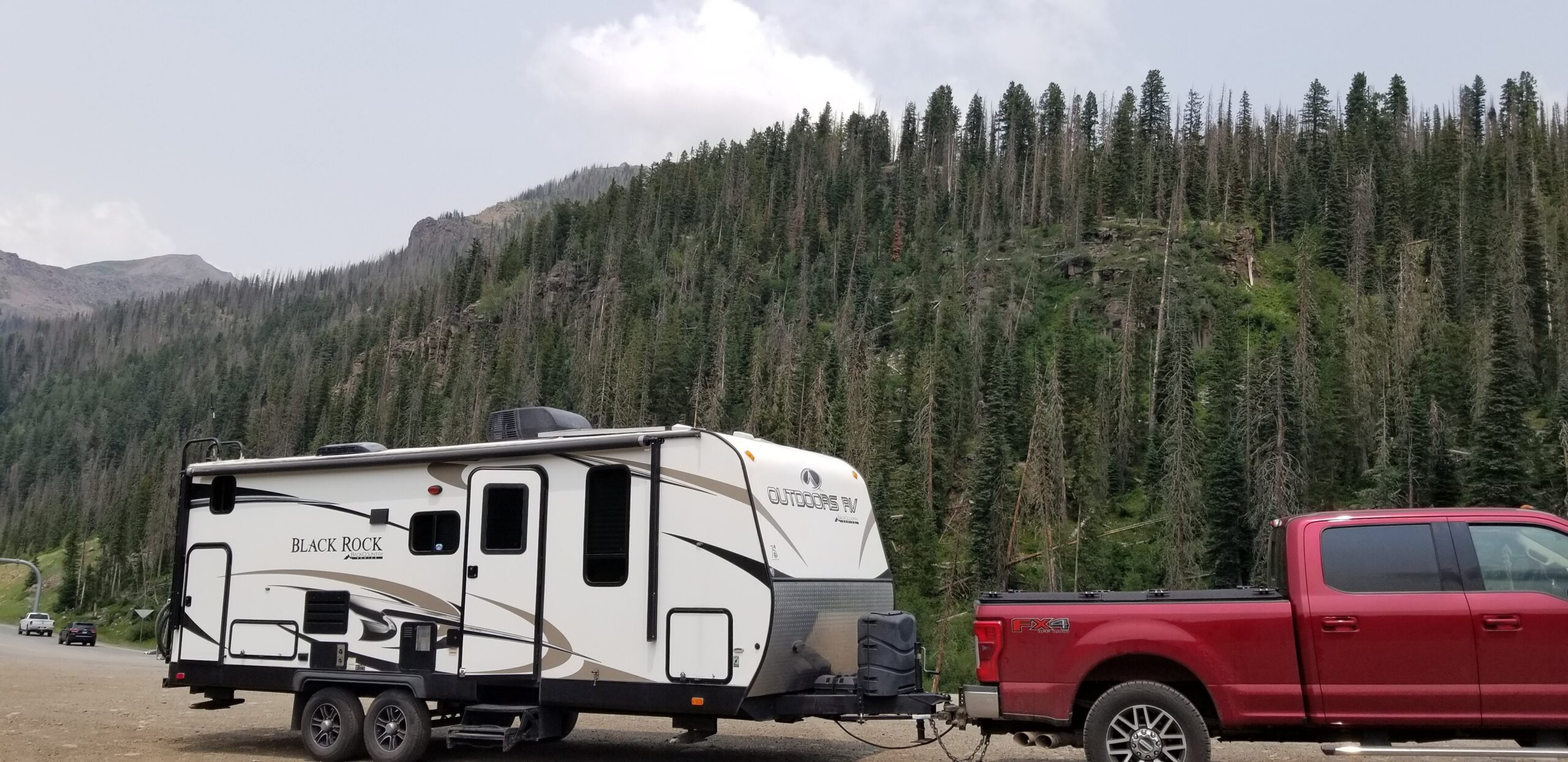
It’s one thing to tow on occasion but I wanted a tried and true diesel to tow as frequently as we do.
I can already hear the arguments. But, I have been ecstatic with how effortless it is to tow our ORV.
Confidence and peace of mind go a long way. Especially when you live on the road.
I can’t say much about the cost of diesel, but at least we get better fuel economy with our F250.
Especially since we also use the truck as a daily driver.
When we’re towing, it ranges from 10 to 12 mpg and when we’re not towing, it’s around 18 mpg. I
have a very light foot and tend to stay to the right (out of everyone’s way). I’m rarely in a hurry.
I’m very happy with my choice of diesel having towed with both gasoline and diesel engines.
Stopping power is more important than “go power” in my book.
I knew that the brake systems on the super-duty trucks from any of the big three could stop the truck and trailer combined.
This was a box that needed to be checked without compromise.
And I’m happy to state that the brakes on the F250 have worked flawlessly under all circumstances.
How do I know?
I recently changed the brakes on my trailer and realized they had rapidly diminished and the truck was doing 95% of the stopping for a short period.
And the truck didn’t complain.
Once again, peace of mind for safety’s sake.
I have no doubt they’re all very capable. Each with its strong suit and each with its issues.
And of course, each with its resale value.
Again, I chose the first truck available that checked all boxes.
Therefore, I can only speak for a Ford F250 in this article/review.

It’s important that you understand these numbers before selecting the right truck for your trailer regardless of whether it’s a bumper pull or a 5th wheel. Let’s keep it simple.
A thorough understanding of these numbers before you buy a truck to tow with is important to understand before going to the dealership (truck or RV).
Just because some half-ton pickups state a high maximum tow rating, doesn’t mean it’s safe to tow heavy loads.
I remember looking at the charts Ford and the other brands put out for each of its truck’s tow capacities.
There were a lot of variables. And honestly, I didn’t understand the weight ratings the way I do now.
I knew nothing about axle weights and gear ratios.
So, in my mind, a 6.7-liter diesel could pull anything since that engine was used in the biggest trucks Ford produced.
I think this is a dangerous position to be in when shopping for a tow vehicle if you have very little experience with towing.
I wish the big truck companies made the process more understandable for those new to the game.
Not buying the proper tow vehicle from the start can be a costly mistake.
Regardless, I happen to have a fairly light travel trailer overall. Not light for the length since it’s built like a tank.
From the tip of the tongue to the bumper, it’s 28′ long.
The factory weighs each ORV and prints a label allowing you to know the exact amount of weight you can add.
This is a great perk to ORV. We almost maxed out since we live in the trailer and it has additional solar panels.
So, the approximate total is a hair under 8000 lbs with full water tanks.
I have not had the truck/trailer combination weighed, so we must use approximate numbers. Fortunately, we don’t have or need a lot of “stuff.”
This weight equates to anywhere from 400bs to 1200lbs of tongue weight depending on how the weight in the trailer is distributed.
More toward the front equals more tongue weight. If the trailer is not level on the hitch, there could be a discrepancy in distribution.
So many variables play a role! We have to use the maximum numbers for safety reasons.
In other words, 8000lb tow weight and 800lb tongue weight as an approximate since we use a weight distribution hitch.
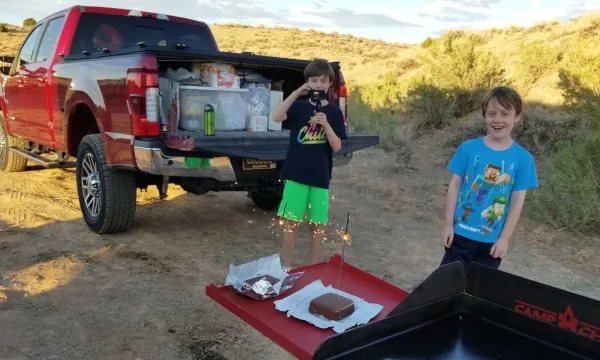
Let’s run some calculations first.
The sticker on the door states a 10,000 GVWR. And the Ford website states the same.
Finding the curb weight of a specific vehicle can be easily calculated by subtracting the combined max weights of occupants and cargo from the GVWR.
Where do you find the maximum weight of occupants and cargo sticker?
It’s located on your tire size and pressure sticker in the door jamb next to the VIN sticker.
My F250 states a max passenger/cargo capacity of 2,163 lbs.
Subtract that from the GVWR and we get 7,837 out of the factory.
Incidentally, Ford assumes four 150lb passengers in the cabin.
So, if you deduct 600 lbs of passenger weight from 2163, you end up with approximately 3/4 tons. Make sense?
Make sure you do some research and understand the carrying capacity and the GCWR (gross combined weight rating).
These are important numbers when deciding on a trailer for your truck or truck for your trailer.
Just because your engine can pull more weight, doesn’t mean the frame can handle that much.
Between the passengers, gear, supplies in the truck bed (we carry additional water in the bed too), tonneau cover, and the weight of the hitch itself, we’re within our limits.
All of that totals approximately 900 lbs.
Add the approximate tongue weight of 800 lbs and it totals 1,700 lbs. We’ve got some room to spare.
We also use a weight-distribution hitch to offset some of the tongue weight.
Take the time to learn how these systems work. And use (and understand) the charts provided for your model year by your manufacturer.
A Few Important Points About Heavy-Duty Pickup Trucks
Before I forget, I want to mention that a Ford F-150 is not a suitable tow vehicle for medium to large travel trailers.
And definitely not for any fifth-wheel trailers.
Since I bought my F250 used, it came with a Diamond Back Tonneau Cover. This was a huge bonus.
I couldn’t have asked for a more secure, solid, and well-built cover.
They’re also not cheap. But it’s strong enough for us to stand on and the heavy-duty locks offer peace of mind.
I highly recommend looking into Diamond Back covers if you need security for your truck bed when towing.
The only two drawbacks are its weight (approximately 150lbs) and it eliminates the potential for a fifth wheel hitch.
Otherwise, I’m very happy with everything about my Diamond Back cover.
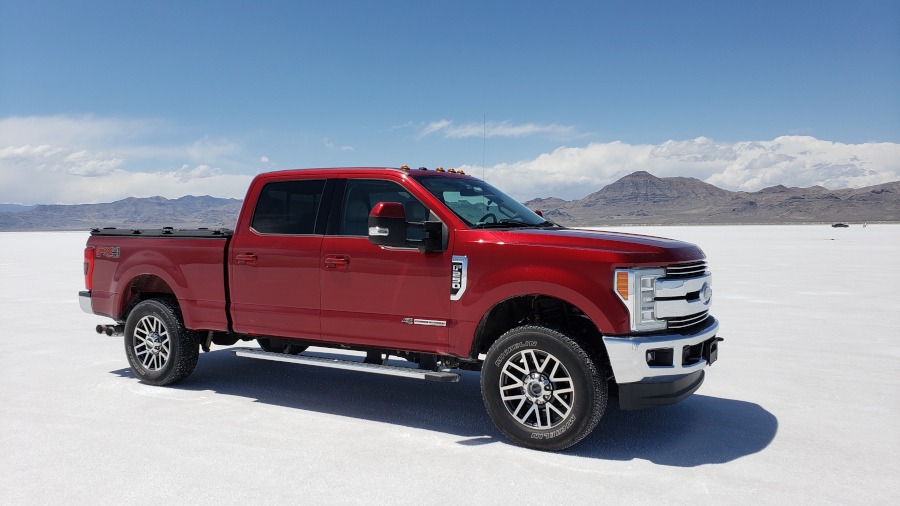
Our F250 on the Salt Flats in Utah.
I wish I had taken the time to learn more about towing capacities before shopping for a tow vehicle.
Fortunately, I got lucky and found the right truck for the job.
But, I wish I had found a Ford Super Duty F-350, so that it gave me room to grow without modifying my current truck.
We’ve talked about a bigger trailer and it would be nice to have that option without an additional expense.
Based on what I’ve learned, I now believe in overkill with trucks.
I don’t want to ever wonder if I overloaded the truck and I want to maintain a huge margin of safety.
I mean, I am pulling my house with the truck along with my family in the truck all over North America.
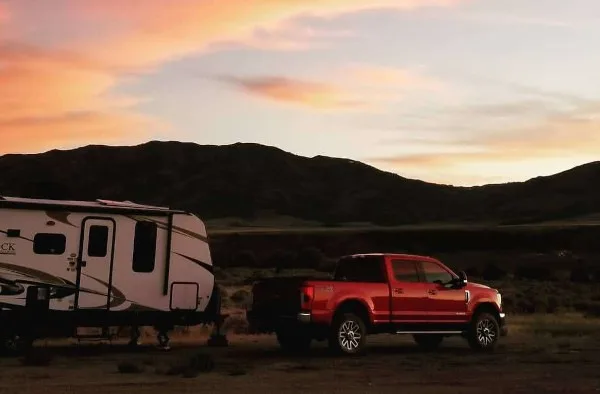
As I mentioned earlier, if you’re going to tow, thoroughly understand how GVWR, GAWR, GCWR, and tongue weight work.
Use those numbers and the charts to find the specific allowable weights for the listed gear ratio of the truck you can afford.
Buying the wrong truck for the job can cost you a lot of money or make for very unsafe towing.
I can’t tell you how often we come across individuals who are towing with the wrong vehicle.
And individuals who bought the wrong truck for what they wanted in a trailer and had to buy a smaller trailer than they had planned.
Not Sure What You Need For Your RV?
Final Thoughts On Towing Our Outdoors RV With A Ford F250
Again, I would prefer a one-ton full-size truck for our ORV to give me more wiggle room to grow.
But, ultimately the 2017 F250 diesel handles our ORV like a dream. I can’t complain.
Do You Tow With An F250?
Happy and safe travels!
Meet the author.
We appreciate any help we can get to bring you great content. Donate or buy us a coffee on our Ko-Fi site.


